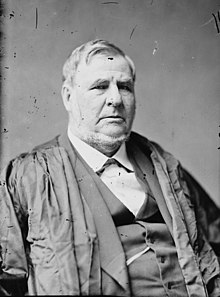David Davis | |
|---|---|
 Portrait by Mathew Brady, c. 1877 | |
| President pro tempore of the United States Senate | |
| In office October 13, 1881 – March 3, 1883 | |
| Preceded by | Thomas F. Bayard Sr. |
| Succeeded by | George F. Edmunds |
| United States Senator from Illinois | |
| In office March 4, 1877 – March 4, 1883 | |
| Preceded by | John Logan |
| Succeeded by | Shelby Cullom |
| Associate Justice of the Supreme Court of the United States | |
| In office December 10, 1862 – March 4, 1877 | |
| Nominated by | Abraham Lincoln |
| Preceded by | John Campbell |
| Succeeded by | John Harlan |
| Personal details | |
| Born | March 9, 1815 Cecil County, Maryland, U.S. |
| Died | June 26, 1886 (aged 71) Bloomington, Illinois, U.S. |
| Political party |
|
| Spouse | Sarah Woodruff Walker (1838–1879) |
| Relations | David Davis IV (great-grandson) |
| Children | 2 |
| Education | |
| Signature | |
David Davis (March 9, 1815 – June 26, 1886) was an American politician and jurist who was a U.S. senator from Illinois and associate justice of the United States Supreme Court. He also served as Abraham Lincoln's campaign manager at the 1860 Republican National Convention, engineering Lincoln's successful nomination for president by that party.
Of wealthy Maryland birth, Davis was educated at Kenyon College and Yale University, before settling in Bloomington, Illinois, in the 1830s, where he practiced law. He served in the Illinois legislature and as a delegate to the state constitutional convention before becoming a state judge in 1848. Shortly after Lincoln won the presidency he appointed the determinedly independent Davis to the United States Supreme Court, where he served until 1877. Davis wrote the majority opinion in Ex parte Milligan, a significant judicial decision limiting the military's power to try civilians in its courts. After being nominated for president by the Labor Reform party in 1872 he pursued the Liberal Republican Party's nomination, but was defeated at the convention by Horace Greeley; despite this, he received one electoral vote in the 1872 presidential election.
Davis was a pivotal figure in Congress's establishment of the 1876 Electoral Commission charged with resolving the disputed Hayes v. Tilden presidential election; he was widely expected to serve as the deciding member of the Commission, but after the Democratic-controlled Illinois State Legislature sought to influence his vote by electing him to the U.S. Senate, Davis excused himself from the Commission and resigned from the Supreme Court to take the Senate appointment. A Republican was appointed in his place, handing the election to Rutherford B. Hayes.
In regard for his independence, he was elected president pro tempore of the United States Senate from 1881 to 1883, placing him first in the line of presidential succession due to a vacancy in the office of the Vice President of the United States following the 1881 assassination of President Garfield. He did not seek re-election in 1882, choosing to retire from public life at the end of his term in 1883.